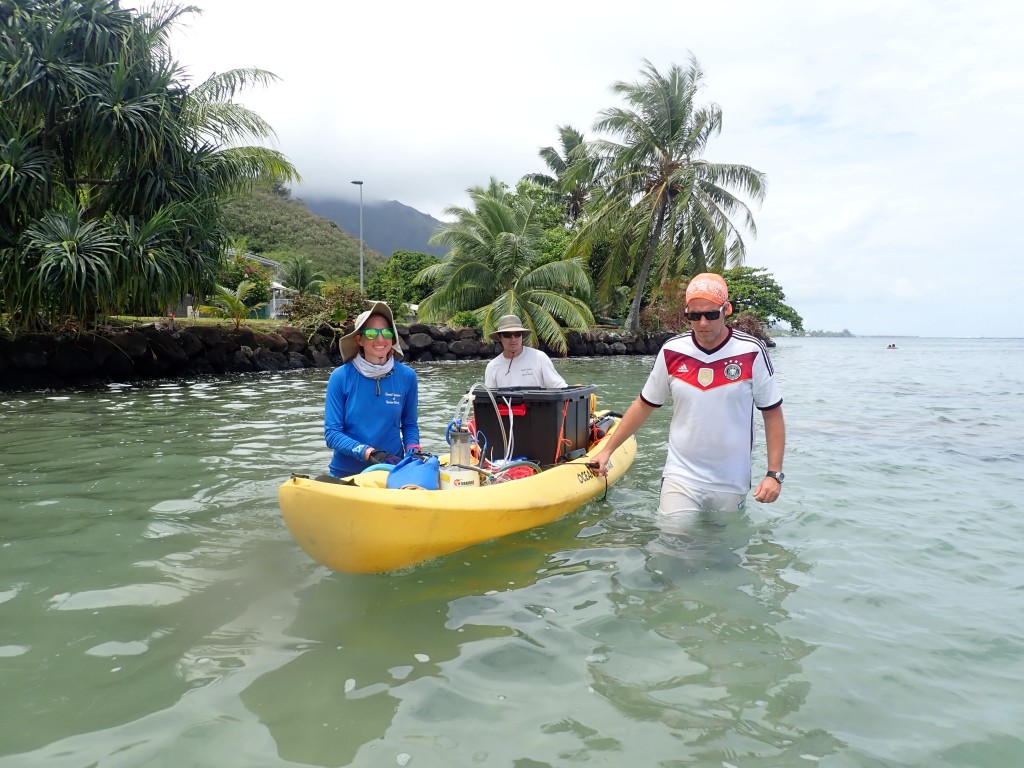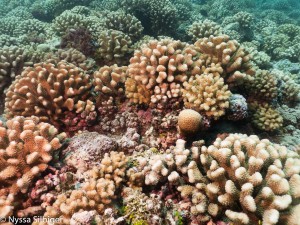CSUN Prof Receives Grant to Study Submarine Groundwater Impacts on Coral Reefs

Nyssa Silbiger (left) and two colleagues measuring groundwater from a kayak in Mo’orea French Polynesia. Photo courtesy of Megan Donahue
Coral reefs are some of the most diverse and valuable ecosystems on Earth that are affected by climate change and other human impacts. Ongoing changes in climate and land-use affect these fragile ecosystems through ocean warming, ocean acidification and altered land-sea interactions. Submarine groundwater discharge – the flow of fresh water from land through the coastal seafloor into the ocean – is a land-sea interaction that is changing and could alter how coral reefs function.
California State University, Northridge assistant professor of biology Nyssa Silbiger – who has more than 14 years of experience researching coral reefs – has been awarded a $1.2 million collaborative grant from the National Science Foundation to research the effects that submarine groundwater discharge has on coral reef health.
Coral reefs are large underwater structures composed of the skeletons of marine invertebrates called coral. Reefs provide a home for millions of marine species including fish, lobsters, clams, seahorses and sea turtles.

Coral Reef photographed in Mo’orea, French Polynesia.
Photo courtesy of Nyssa Silbiger
Submarine groundwater discharge is a natural feature of many nearshore coral reef ecosystems that can alter the chemistry and biology of marine environments, Silbiger said.
“We don’t really have a strong understanding of how this particular process [submarine groundwater discharge] is influencing coral reef ecosystem functioning,” Silbiger said.
“One of the reasons why this is so important is because submarine groundwater can act as a conduit for land-based nutrients and pollutants. Polluted groundwater can then flow onto the reefs through fissures in the land or seafloor and impact coral reef organisms,” she said.
Coral reefs are delicate ecosystems that are easily physiologically stressed. Changes in ocean temperature cause coral bleaching – algae expelled within the tissue of reefs – that can lead to coral death and irreversible damage to the millions of marine species that live within and around the reefs.
“Coral reefs make up a really small portion of the ocean [less than one percent] however, they contribute disproportionately to our global economy,” Silbiger said.
Commercial and recreational managed fisheries depend on coral reef habitats for many important fishes, shellfish and other invertebrates that are targeted for fishing. Coral reef fisheries are worth $5.7 billion globally, according to the Reef Resilience Network.
By collaborating with marine ecologist Megan Donahue of the Hawai’i Institute of Marine Biology, microbial ecologist Craig Nelson of the University of Hawai’i at Mānoa and two hydrologists from California State University, Long Beach, Silbiger is examining how the groundwater is affecting coral reef health in Mo’orea, French Polynesia.
The process of detecting submarine groundwater discharge involves using different types of natural geochemical tracers – substances used to detect distinctive properties in water – and hydrogeological tools that calculate how much groundwater is released into the costal ocean. One of the tracers used by the team looks for radon – a radioisotope – in the water that is only detectable if the fresh water hasn’t interacted with air for a very long time.
Once radon is found, the team then analyzes the chemistry of the water to determine its nutrients, pH levels, (acidity scale), temperature and salinity to see how it affects coral reefs.
Initial results of the research revealed that submarine groundwater discharge affects reef growth and the natural breakdown of coral reefs by reef organisms. Silbiger said much of that is due to the enriched nutrients found in the groundwater that could benefit corals reefs that were at an intermediate distance. Coral reefs that were too close to the groundwater discharge didn’t fare well because of the freshness of the groundwater.
However, if the groundwater is polluted, it can have damaging and sometimes irreversible effects on the reefs, she said.
“It is really important to understand how submarine groundwater is affecting coral reefs now, so we can predict how changes in groundwater will affect reefs in the future,” Silbiger said.
To find out more information on Nyssa Silbiger’s work, please visit http://nyssasilbiger.com/

 experience
experience